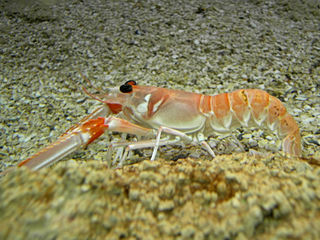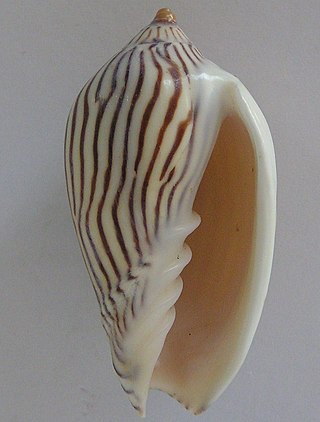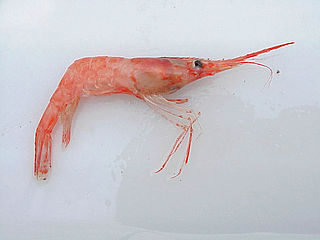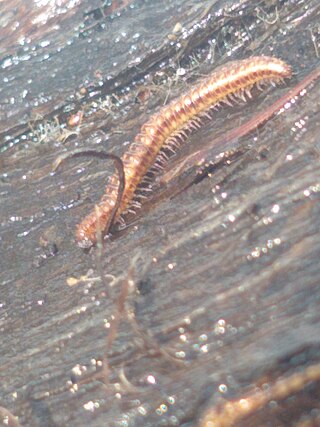William Elford Leach FRS was an English zoologist and marine biologist.

Nephrops is a genus of lobsters comprising a single extant species, Nephrops norvegicus, and several fossil species. It was erected by William Elford Leach in 1814, to accommodate N. norvegicus alone, which had previously been placed in genera such as Cancer, Astacus or Homarus. Nephrops means "kidney eye" and refers to the shape of the animal's compound eye.

The Ocypodidae are a family of semiterrestrial crabs that includes the ghost crabs and fiddler crabs. They are found on tropical and temperate shorelines around the world.

Nebalia is a large genus of small crustaceans containing more than half of the species in the order Leptostraca, and was first described by William Elford Leach in 1814. The genus contains over thirty species:

Athanas is a genus of shrimp of the family Alpheidae. These are small shrimp measuring 2 cm in length. Females have smaller chelae than males.

Bulimulidae is a taxonomic family of medium-sized to large, air-breathing, tropical and sub-tropical land snails, terrestrial pulmonate gastropod molluscs in the superfamily Orthalicoidea.

Hippolyte is a genus of shrimp of the family Hippolytidae, containing the following species:

Sphaeromatidae is a family of isopods, often encountered on rocky shores and in shelf waters in temperate zones. The family includes almost 100 genera and 619 known marine species. Within these genera, there are groups that share distinctive morphologies; further research may reclassify these genus-groups as separate families.

Rissoidae is a large family of very small and minute sea snails with an operculum, marine gastropod mollusks in the superfamily Rissooidea and the order Littorinimorpha.

Hesperilla is a genus of skipper butterflies in the family Hesperiidae, found throughout most of Australia.

Amoria zebra, common name the zebra volute, is a species of sea snail, a marine gastropod mollusk in the family Volutidae, the volutes.

Hyas is a genus of oregoniid crabs.

Pandalus is a genus of shrimp in the family Pandalidae. Members of the genus are medium-sized and live on or near the seabed. Some species are the subject of commercial fisheries and are caught by trawling. One species, Pandalus montagui, lives in association with the reef-building polychaete worm, Sabellaria spinulosa.

Praunus is a genus of mysid shrimp, comprising three species:

Julida is an order of millipedes. Members are mostly small and cylindrical, typically ranging from 10–120 millimetres (0.39–4.72 in) in length. Eyes may be present or absent, and in mature males of many species, the first pair of legs is modified into hook-like structures. Additionally, both pairs of legs on the 7th body segment of males are modified into gonopods.

Geophilus is a large, heterogeneous genus of soil centipedes in the family Geophilidae largely considered to be synonymous with Brachygeophilus. It is a mostly holarctic genus characterized by a claw-shaped ultimate pretarsus, anterior porefields, complete or nearly complete coxo-pleural sutures at the prosternum, and incomplete chitin-lines. Centipedes in this genus range from 1 cm to 8 cm in length. The generic name first appeared in Brewster's Edinburgh Encyclopaedia in 1814 as Geophilus electricus.

Craspedosomatidae is a family of millipedes in the order Chordeumatida. Most adult millipedes in this family have 30 segments, but some have only 28. There are at least 30 genera and 210 described species in Craspedosomatidae.

Maera is a genus of crustacean in the family Maeridae, and was first described by William Elford Leach in 1814. It consists of the following species:

Mictis is a genus of sap-sucking insects in the family Coreidae, with species recorded from India, China, Vietnam and Malesia through to Australia. It was described by William Elford Leach in 1814.

Craspedosoma rawlinsii is a species. It is native to central Europe, where it can be found in Germany and Poland, with its range including the United Kingdom. It has been introduced into Canada.



















